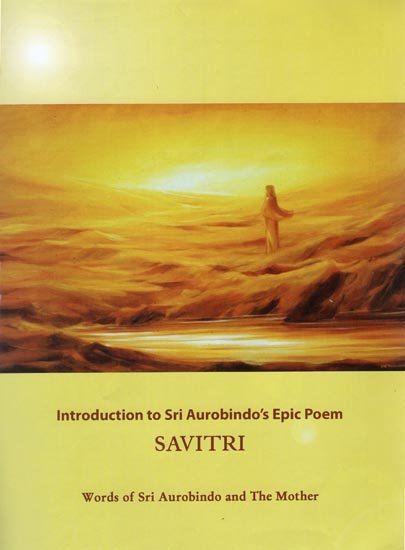
The poet is Sri Aurobirdo, the great son and seer of India. His other major contributions are,The Life Divine, Essays on the Gita, Foundations of Indian culture, The Human Cycle, Synthesis on yoga, Bases of yoga, The Upanishads, Secrets of the Veda, Letters on yoga and more.
The story of Savitri and Satyavan is unique amorg Legends and history and it is well known in India. Sri Aurobindo has not created this ; he has taken it from Mahabharata and developed it in to a symbol. The tale is recited in the Mahabharata in about seven hundred Lines in the original Sanskrit, Sir Aurobindo has expanded and transformed into a modern English epic in twelve books, of forty – nine cantos, spread over nearly twenty- four thousand lines. He has not add any extra character or events into it, the story remains exactly the same – the only thing he has done is , he has given a significance to the story. It will be seen that although the modern epic in English is about thirty – five times as long as the ancient Upakhyana in Sanskrit, although they are separated by two or three millennia of historic time, yet they are grounded on more or less that same base and seem to rise and stand in the same solitary grandeur against the contemporary literary Landscape. The main lines of the human story remain unaltered, in spite of the successive revisions or recasts of the epic in Sri Aurobindo’s hand. There are, however, elaborations, psychological exploration, which are grafted on the original so as to give the epic impressive new dimensions quite beyond the new scope of the Upakhyana. On the other hand , it will be seen mighty though the overreaching Banyan that is the epic, its seed – no bigger than an atom – is still in the old bardic poem. The bare bones of the original are Aswapati’s eighteen – year long austerities followed by the birth of Savitri , the challenge of fate when Savitri marries Satyavan , Savitri’s three nights fasting and austerities, and Savitri triumphing over Yama and fate and reclaiming ‘lost’ Satyavan and redeeming her parents and parents – in law’s family fortune. Sri Aurobindo’s epic retains their cardinal features but packs them with enormous fresh significance.
Sri Aurobindo spent almost forty to fifty long years to write and complete Savitri . A disciple once asked him “ why have you chosen Savitri as the heroine of your epic?” he continued “ why not Radha, why not Sita, why not Dranpadi, why not Maitreyi, why not Ahalya? They were all equally great mythic heroines of ancient time. What is the reason for choosing Savitri? In response, Sri Aurobindo said “Savitri is the only heroine who never cried in her life – all others have cried when tragedy fell upon them”.
It is characteristic of Savitri that she never weeps, Satyavan weeps aloud thinking of his parents, Dynmatsena weeps thinking of his son; Savitri does not weep – not when Narad speaks the cruel words, not when Satyavan dies, nor when after coming back to life. Neither it is callousness indifference, or want of feeling ; rather it is the measure of her stern purpose, her poised preparedness to face any eventuality whatsoever by her tranquil consciousness of her own strength. There is a quality in Savitri – her flaming love for Satyavan – that gathers up and gives edge to her other qualities, her beauty, truthfulness, goodness and power. If Savitri never weeps, neither does she ever beg as play the pathetic, suppliant. When Narad’s terrible warring is uttered, Aswapati asks her to choose again, she does not plead with them to be permitted to marry Satyavan; she merely says that once only can her heart be given away. It is Narad who changes his mind and persuades Aswapati to give her in marriage to Satyavan. Neither Divine sage nor terrestrial king is able to resist her steely resolution. She takes the decision to undertake tri-ratra vow herself ; her father-in-law later merely acquiesces in her decision. Hers is the decision not to touch food even on the fourth day till nightfall ; hers too is the decision to accompany her husband on the fatal day to the woods. “I am determined to go with you please do not forbid me’’ she tells to Satyavan : even her request to her parents- in- law is couched in such terms that there can be only one answer. When the anticipated blow comes at last and life is extinct in Satyavan and Yama stands in front of her, her self – possession does not leave her, she is Savitri still. There is just a hint of defiance in her question (not meant as such, thought) in her question : who are you , and what is it you want to do ? when carries away Satyavans life (prana), she follows her husband, and every time speaks only when spoken to by Yama; there is no pleading or entreaty in her voice or aspect ; she speaks fairly and truly and wisely, and increasingly Yama is put in the defensive. Yama is also dharma; the lord of Death is also – should be also – the lord of Righteousness. This is the whole point of her gentle, seemingly sententious, speeches. She does not ask, it is Yama who offers one boon after another, and she takes them as they come , thinks first of her parents-in-law, then of her own parents, and last only of herself and Satyavan Yama almost feels instructed more and more feels awakened to his own role as Dharma , and so it is with relief that he releases Satyavan’s life and takes leave of Savitri.
Savitri is thus throughout digrified, masterful and dependent without for a second lacking in real womanliness or respect for elders or reverence for tradition. Savitri is an example of a woman who is not ‘ inadequate in love’ who is not ‘ uncertain in resolve’ and who is not ‘ incapable in the presence of death’. She bravely faces the ‘existential problem’ and master it; she is the redeemer of the world . There is, indeed no heroine in the world’s literature who is quite as adorably human and at the same time as lovably divine as Savitri.
Whatever Sri Aurobindo has seen and experienced, he has written in Savitri. In some sense it is an autobiography of Sri Aurobindo, in some sense it is a biography of the mother, her spiritual collaborator and in some sense it is a biography of all kinds of human binges located in different planes. It is an association of associations; he has created a large spiritual flood in Savitri. There must be a new extension of consciousness and aesthesis to appreciate a new kind of mystic poetry.
By Ramkrushna Mohanta


